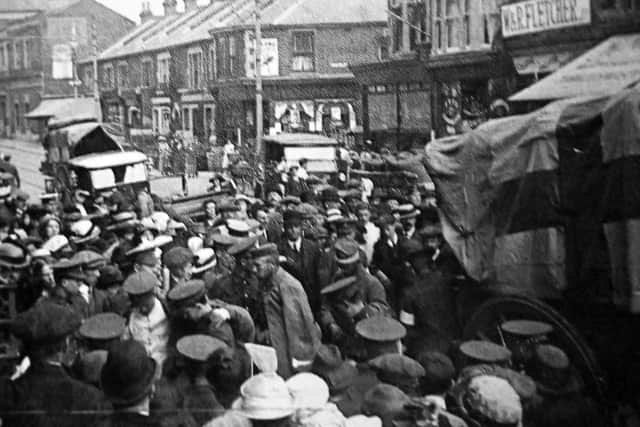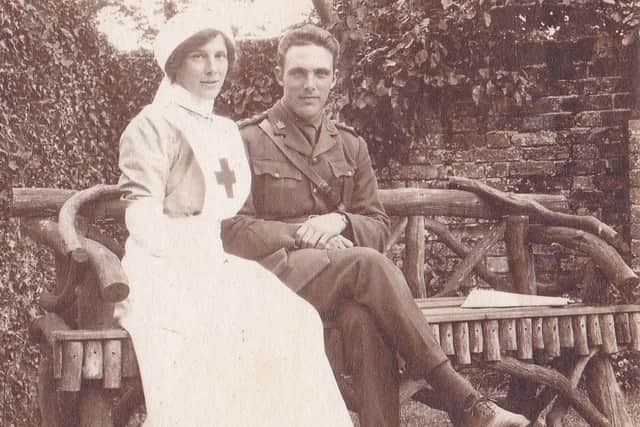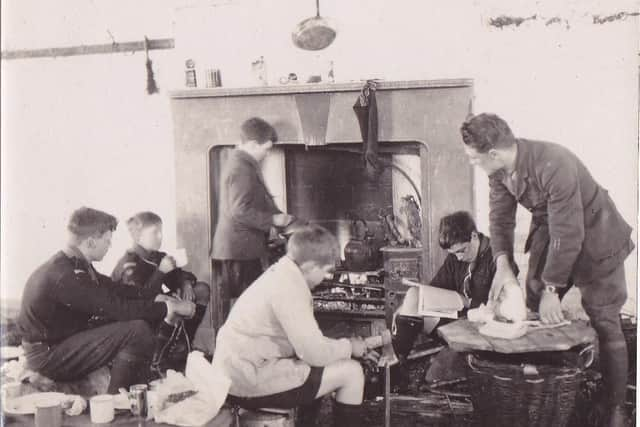Untold story of hero who tended war wounded in Portsmouth


For Sarah Reay the abiding memory of her grandfather was his voice.
Her first memory of him was when she was about five. '˜He was a very old man of average height with a fine bronze-coloured, weather-beaten complexion and a full head of thick snow white hair,' she recalls.
Advertisement
Hide AdAdvertisement
Hide Ad'˜His spoken words were delivered in a very mellow peaceful manner.


'˜His voice was soft, husky and vibrant with almost an air of magic '“Â I had never heard anyone speak so distinctively before.'
There was good reason for that voice. For many years before Sarah's birth a piece of German shrapnel had slashed through his jaw and voice box.
That '˜magical' voice was to prove mightily useful in Portsmouth because the Rev Herbert Butler Cowl would use it to bring succour to hundreds of dying and severely wounded men evacuated here from the hell of the First World War battlefields.
Advertisement
Hide AdAdvertisement
Hide AdFor Herbert was an army chaplain, a calling which has received scant mention in the build-up to this weekend's commemoration of the centenary of the Armistice '“ the event which would eventually bring to an end what in retrospect was laughingly called The Great War. Hollow laughter.


Sarah says: '˜No man wanted to be forgotten and left behind in the mud of Flanders.
'˜It was comforting for the soldiers to know, and be re'assured, that if the worst fate should come to them, the padre, a good man would inter them and send them to heaven with the full blessing of God.'
Herbert was unique, not for the comfort he undoubtedly brought to the limbless, gassed, blind and psychologically tortured men from Flanders' fields, but because he is the only army chaplain to have been awarded the Military Cross for his actions on a ship during the entire war.
Advertisement
Hide AdAdvertisement
Hide AdHe suffered those injuries to his face and voice box on the front line 103 years ago, in November 1915.
Herbert was sent home to Britain on board the hospital ship HMHS Anglia. She was in the English Channel, off Folkestone, when she hit a mine and sank with the loss of 164 lives '“Â the first Red Cross ship to be lost to enemy action in the war off the south coast.
Herbert handed his lifebelt to someone he thought needed it more than himself for which he was awarded the Military Cross.
He survived and a year later found himself posted to Portsmouth serving as a chaplain to the Portsmouth Garrison until September 1919.
Advertisement
Hide AdAdvertisement
Hide AdSarah has spent years researching her grandfather's story and writing a book about him, The Half-Shilling Curate, A Personal Account of War and Faith 1914-1918.Â
Why the half-shilling? Sarah says it was what he was called affectionately by the family. '˜His lack of experience led him to feel he was 'not the full shilling'.
Like so many people in the past four years, moved by the various First World War anniversaries that have come and gone, Sarah wanted to know more about her modest grandfather. She discovered his private letters, writings and photographs in old family boxes. '˜As my research unfolded, so I became more and more proud of my grandfather,' she adds.
'˜He was one of the youngest '“ aged 28 '“ army chaplains and he signed up to the war on Christmas Eve 1914.Â
Advertisement
Hide AdAdvertisement
Hide Ad'˜After being severely wounded at the front on active service, he was sent back to Blighty and his actions aboard the sinking hospital ship Anglia meant he became one of the youngest and first army chaplain recipients of the Military Cross for exemplary gallantry.'
She discovered, through one of his many letters to his parents, that he lived in a flat at Clarendon Road, Southsea, '˜over Miss Best's milliner shop'.
Sarah says: '˜His descriptive account of his experiences as a young army chaplain illustrate the value of faith during the war '“Â the balance between serving God and carrying out his duties as a captain in the British Army.'
It's an engaging story telling the story of a man  who matured from humble Christian beginnings in Leeds  to the start of his journey discovering faith, love and a sense of duty and moral responsibility.
Advertisement
Hide AdAdvertisement
Hide Ad At the outbreak of war, he volunteered to become a Wesleyan army chaplain. With meticulous detail, the reader is taken on Herbert's journey with the Durham Light Infantry from the objective view of life in the Army Home Camp in Aldershot, to the adventure of France and the reality of Flanders on the Western Front near Armentières.
And then Sarah turned up this note written by Herbert Cowl after an evening tending and talking to the wounded in a makeshift hospital ward in a hall in Portsmouth, describing the scene simply yet beautifully:
'˜One evening I entered that room for some week night meeting and there covering the floor and propped up against the walls, packed from end to end, side to side were wounded men just unloaded from the Western Front.
'˜They were the heroes of the hour and very well they knew it, but for all their pathetic disfigurements and their ghastly wounds, they were the gayest company I remember meeting.'
His story is unique and until now it has never been told.
Advertisement
Hide AdAdvertisement
Hide Ad'¢ The Half-Shilling Curate, A Personal Account of War And Faith 1914-1918 by Sarah Reay, is available in hardback from Amazon from £15.
Â
Cowl '“ just the man they wanted
Army chaplains not only provided spiritual guidance and sustenance to the men, but they became major contributors to general morale during the First World War.Â
They also gave invaluable assistance in field ambulances on the front line, helping medical staff from doctors to stretcherbearers.Â
More than 5,000 army chaplains served in that war. Most received little or no training and, like the soldiers, had no comprehension of the horrors they would face.
Advertisement
Hide AdAdvertisement
Hide AdThey worked in the army camps and the garrisons like Portsmouth's. Remember, the town had a massive army presence then as well as being the home of the Royal Navy.
They also had a key role to play in helping to prepare men for what they had to face at the front in battle and also supported the wounded and sick who returned home.
Most of the chaplains had no experience of working with soldiers before the First World War. It was considered to be a righteous war and the churches responded with a supply of suitable candidates. This ranged from being physically fit, to the ability to preach '˜extempore' (off the cuff), an ability to ride a horse and to speak a foreign language.
Herbert Cowl was one of the youngest Wesleyan Army Chaplains in 1914. He was born in Leeds in 1886 and finished his training to become a Methodist minister in 1910. Despite being in his 20s, he was considered to have all the qualities that the Royal Army Chaplains' Department was looking for.
Â
Advertisement
Hide AdAdvertisement
Hide AdThe German mine which could have killed an injured King George V
If the hospital ship Anglia had hit the mine in the English Channel a few days earlier it might well have claimed the life of the King.
George V had a riding accident while visiting troops in France and was evacuated in Anglia back to Britain to recuperate.
The ship was first used on the Holyhead to Dublin ferry route but when the First World War started she was requisitioned and refitted as a hospital ship ferrying thousands of injured men home from France.
Advertisement
Hide AdAdvertisement
Hide AdWhen she hit that mine, laid by a German U-boat, on November 17, 1915, and sank (as depicted on Page 1) she was carrying 13 officers and 372 other ranks. After 15 minutes she lurched, turned partially on her side and went down settling, almost upright, on the seabed with her masts just above the water.'‹'‹'‹'‹'‹'‹'‹'‹'‹'‹'‹'‹'‹'‹'‹'‹'‹'‹'‹'‹'‹'‹'‹'‹'‹'‹'‹'‹'‹'‹'‹'‹'‹'‹'‹'‹'‹'‹'‹'‹'‹'‹'‹'‹'‹'‹'‹'‹'‹
Â
Â
Â